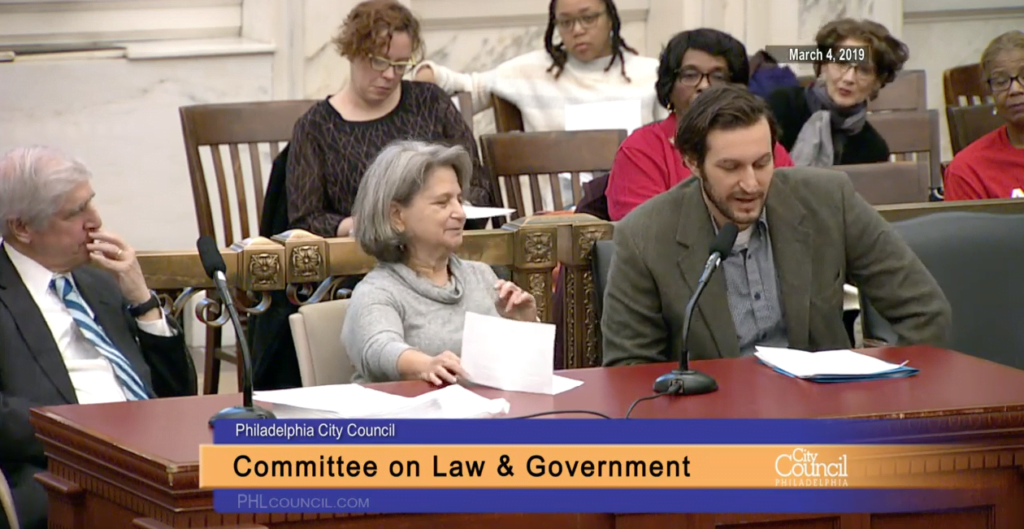
Randy LoBasso (right) testifies in favor of Bill 180818
Council President Darrell Clarke recently introduced legislation which would create a civilian enforcement arm to the Philadelphia Police Department, specifically for traffic and low-level issues, hopefully providing for safer streets and dealing with congestion in West Philly, Center City, and Manayunk (at least at first.)
The Bicycle Coalition supports this idea and testified in favor of the legislation on Monday, with the idea that civilian enforcement officers could help provide safer streets via ticketing motorists who illegally park in the bike lane, and those who block “the box” and the crosswalk, which will make the streets safer for pedestrians.
Below, see the Bicycle Coalition’s full testimony to City Council about Bill 180818.
Thank you for the opportunity to testify today. The Bicycle Coalition of Greater Philadelphia applauds Council President Clarke for introducing Resolution 180818 and for holding this hearing regarding making Philadelphia safer for all road users, and to better deal with congestion for Philadelphians.
One of the big transportation stories of the last few years in Philadelphia has been congestion and safety. As was reported in the Philadelphia Inquirer in January, Center City added 16,558 jobs from 2008 to 2017. Nearly 7,000 vehicles a day travel Chestnut Street east of Broad Street, up 17 percent since 2011.
And although Center City makes up just seven percent of Philadelphia’s total land mass, it accounts for 42 percent of the city’s jobs and about 80 percent of our tourism.
Center City is generally considered one of the most walkable parts of Philadelphia, and, based on our bike counts and the federal government’s surveys over many years, one of the most- biked places in the city and, actually, the entire country.
Philadelphia has the largest share of bicycle commuters of any large city in the country, and the plurality of them head into Center City. They come from every direction.
According to the latest U.S. Census data, 7.3 percent of commuters in the Greater Center City area get to work by bike. 8.1 percent of commuters from South Philadelphia area arriving at their jobs by bike.
We’re additionally seeing an increasing bicycle population in West, Southwest and, most interestingly, Northwest Philadelphia. These numbers do not include college students or people who work from home but use a bicycle to get around the city. Between 2016 and 2017, as bicycling fell in cities like San Francisco; Los Angeles; and Austin, TX; it grew in Philadelphia by 20 percent.
While congestion is an issue in Philadelphia, from the cycling community’s perspective, we look at this as a way to make our streets safer. And we have data from New York City, Baltimore, Chicago and Seattle, to show that civilian officers have had a positive effect on safety of pedestrians, cyclists, and motorists in the city.
There are streets in Center City where, at any time of day, you will find a commercial or private vehicle parked in the bike lane. PPA data has shown a 173 percent increase in tickets for vehicles parked in bike lanes since 2014—and, talk to any cyclist who navigates through the city on a regular basis, and they will tell you it’s not nearly enough.
The Bicycle Coalition believes civilian officers could have a positive impact on congestion, safety and could help enforce illegal parking which, more than anything, slows down traffic and frustrates driver, putting all road users at risk.
Incorporating bicycle safety courses in training modules can educate officers on the role cyclists and pedestrians play in overall traffic patterns and assist them in finding the best methods to ensure motorists, transit, pedestrians, and cyclists all feel safe.
Additionally, bicycle safety courses can improve interest in biking safety and enforcement and remove misconceptions officers may have of cyclists.
There are concerns, too. During the implementation phase, we believe it’s important to ensure, among other things, there are checks on civilian enforcement officers as it pertains to racial bias. There are examples throughout the country, in cities like Tampa, Chicago and across the river, in Camden, NJ, where civilian and police enforcement officers have issued a disproportionate number of tickets for minor offenses in African-American communities, which is something we need to make sure does not happen here.
We agree all unsafe behavior by all road users, including bicyclists, should be addressed in this new enforcement effort. But, we caution that cyclists should not be singled out for disproportional enforcement such as we have seen in other cities, such as New York City. Education and enforcement must go hand in hand together to send an important public safety message about the need for everyone to put safety over convenience.

Will they also ticket bikers who ride on pavements, not stop at stop signs, and almost run people over? Bikers do need safety rules, but some of the riders are ignorant and almost run over h7mans.
Hi S:
Did you read the bill, the article, and the testimony, or is this rhetorical?